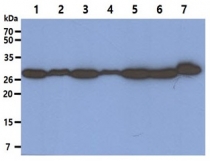ARG57143
anti-PSME1 antibody [12H3]
anti-PSME1 antibody [12H3] for Western blot and Human
Overview
| Product Description | Mouse Monoclonal antibody [12H3] recognizes PSME1 |
|---|---|
| Tested Reactivity | Hu |
| Tested Application | WB |
| Host | Mouse |
| Clonality | Monoclonal |
| Clone | 12H3 |
| Isotype | IgG2a, kappa |
| Target Name | PSME1 |
| Antigen Species | Human |
| Immunogen | Recombinant fragment around aa. 1-249 of Human PSME1 |
| Conjugation | Un-conjugated |
| Alternate Names | REG-alpha; Proteasome activator 28 subunit alpha; PA28alpha; Activator of multicatalytic protease subunit 1; 11S regulator complex subunit alpha; Interferon gamma up-regulated I-5111 protein; PA28A; IGUP I-5111; IFI5111; Proteasome activator complex subunit 1; REGalpha; PA28a |
Application Instructions
| Application Suggestion |
|
||||
|---|---|---|---|---|---|
| Application Note | * The dilutions indicate recommended starting dilutions and the optimal dilutions or concentrations should be determined by the scientist. |
Properties
| Form | Liquid |
|---|---|
| Purification | Purification with Protein A. |
| Buffer | PBS (pH 7.4), 0.02% Sodium azide and 10% Glycerol. |
| Preservative | 0.02% Sodium azide |
| Stabilizer | 10% Glycerol |
| Concentration | 1 mg/ml |
| Storage Instruction | For continuous use, store undiluted antibody at 2-8°C for up to a week. For long-term storage, aliquot and store at -20°C. Storage in frost free freezers is not recommended. Avoid repeated freeze/thaw cycles. Suggest spin the vial prior to opening. The antibody solution should be gently mixed before use. |
| Note | For laboratory research only, not for drug, diagnostic or other use. |
Bioinformation
| Database Links |
Swiss-port # Q06323 Human Proteasome activator complex subunit 1 |
|---|---|
| Gene Symbol | PSME1 |
| Gene Full Name | proteasome activator subunit 1 |
| Background | The 26S proteasome is a multicatalytic proteinase complex with a highly ordered structure composed of 2 complexes, a 20S core and a 19S regulator. The 20S core is composed of 4 rings of 28 non-identical subunits; 2 rings are composed of 7 alpha subunits and 2 rings are composed of 7 beta subunits. The 19S regulator is composed of a base, which contains 6 ATPase subunits and 2 non-ATPase subunits, and a lid, which contains up to 10 non-ATPase subunits. Proteasomes are distributed throughout eukaryotic cells at a high concentration and cleave peptides in an ATP/ubiquitin-dependent process in a non-lysosomal pathway. An essential function of a modified proteasome, the immunoproteasome, is the processing of class I MHC peptides. The immunoproteasome contains an alternate regulator, referred to as the 11S regulator or PA28, that replaces the 19S regulator. Three subunits (alpha, beta and gamma) of the 11S regulator have been identified. This gene encodes the alpha subunit of the 11S regulator, one of the two 11S subunits that is induced by gamma-interferon. Three alpha and three beta subunits combine to form a heterohexameric ring. Alternative splicing results in multiple transcript variants. [provided by RefSeq, Jul 2013] |
| Function | Implicated in immunoproteasome assembly and required for efficient antigen processing. The PA28 activator complex enhances the generation of class I binding peptides by altering the cleavage pattern of the proteasome. [UniProt] |
| Calculated MW | 29 kDa |
Images (1) Click the Picture to Zoom In






